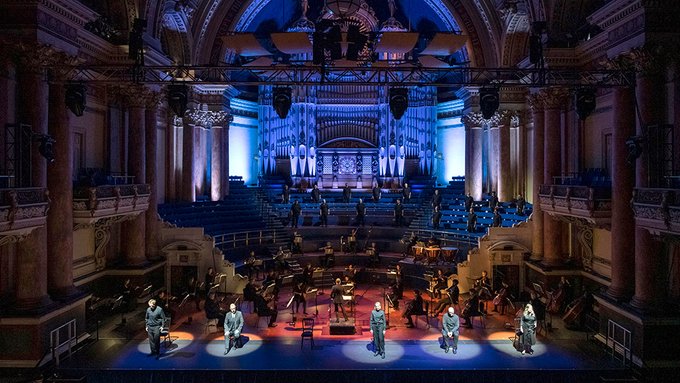
IT was 451 days since Opera North’s last appearance before a live audience, according to general manager Richard Mantle. #
This was also claimed as the first night of this version, despite having the same cast – though with a different conductor – as had taken part in the livestream performance last December.
The explanation may well lie in the mysterious omission from the programme of the then director Matthew Eberhardt. Indeed no director was named at all this time round.
Conducting Francis Griffin’s reduced orchestration was Paul Daniel, erstwhile music director of Opera North (1990-97). With a dozen 25-year members in his orchestra, he was on familiar territory and conjured an easy response from his charges, notably hushed at the start of the quartet and at the emergence of the prisoners.
Occasionally, in Act 1, he strayed too far the other way. But he did not have the benefit of a sound engineer to balance the tone as his predecessor had enjoyed online.
At some point our critical faculties may kick in again, but at this stage it hardly mattered. December’s anger had dissipated into a vast sense of relief on both sides of the podium – the sheer joy of seeing singers, players, audience – so that gratitude outweighed most other considerations.
There were some slight differences in approach by the principals. With her short hair parted in the centre, Rachel Nicholls’s Leonore looked more boyish than ever. Her anguished recitative prepared a Komm, Hoffnung that was both powerful and heartfelt, underpinned by succulent horns – a champagne moment.
Toby Spence’s Florestan opened up with a spine-chilling Gott, delivered from a seated position with head bowed, that seemed to come from nowhere. When they reached their final duet, they could hardly contain their laughter, so absurd did it seem not to embrace.
Robert Hayward’s vengeful Pizarro was more psychopathic than ever, while Brindley Sherratt’s Rocco had greater bite, tougher and less avuncular. The youngsters, sung by Oliver Johnston and Fflur Wyn, were similarly more vivid.
Matthew Stiff’s genial Don Fernando delivered David Pountney’s intermittent English narrative, but all else was sung in German. Glorious Technicolor it was not, but contrasts ran deeper, enhanced by Daniel’s knack of emphasising the score’s darker timbres.
Review by Martin Dreyer
